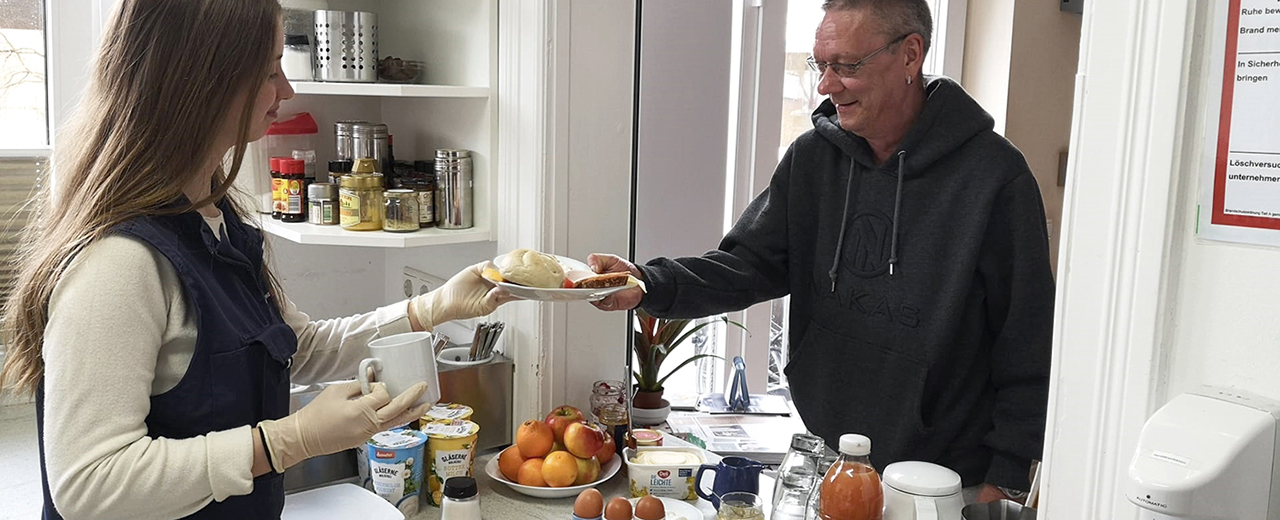 Starting the day without hunger
Starting the day without hunger
Addressing malnutrition among homeless people in Hamburg
Dominic M. is 26 years old. Until recently, he lived a good, seemingly secure, completely normal life: He had a well-paid job as an industrial climber, was active in the volunteer fire brigade and as a sport climber. However, his company dismissed him because of a lack of work. Because of Covid, new job prospects quickly disappeared. When he broke up with his partner shortly afterwards, he had to move out of the flat they shared - suddenly he was homeless. As an athlete, it was important for him to eat a wholesome diet. By becoming unemployed and then homeless, he became destitute and could no longer afford this. Leftover baked goods, tinned food and ready-made soups were now on the menu. Elementary things like sleeping, personal hygiene or eating became constant challenges and cost him a lot of energy. Dominic received professional support - and he wanted to make a change. He was able to regain his strength and is now training to become a paramedic.
Necessity
A healthy breakfast for homeless and destitute people in Hamburg
Activity
The preparation of a daily nutritious and wholesome breakfast for homeless people at the Harburg-Huus
Countable effort
Number of homeless people who regularly receive a wholesome breakfast at the Harburg-Huus
Result
More homeless people regularly eat more wholesome food and have a higher quality of life and increased life expectancy
Systemic effect
The homeless people are in better nutritional condition, get sick less and the awareness of wholesome nutrition increases among them
Background
Approximately 678,000 people are considered homeless in Germany – in Hamburg there are 1,910 people (estimated unreported number 5,400) who have no place to live. Life on the streets affects people and they have an average life expectancy of 44.5 years, 30 years less than the rest of the population (Ishorst-Witte, 2001). Most of the clients of the Harburg-Huuse also show signs of deficiency due to years of alcohol and drug abuse as well as an unbalanced diet. They often have chronic pre-existing conditions. Because those affected are exposed to extreme weather conditions such as rain, cold, snow and heat, which often cause poor health, special nutritional supplements and a balanced diet are necessary. To make matters worse, due to inflation and the consequences of the war in Ukraine, the food banks are no longer getting enough food to support an increasing number of people in need. This acute shortage of food is also felt by the Harburg-Huus: Many poor people from the region can no longer afford the increased energy and food prices. They are increasingly turning to the Harburg-Huus at the moment and coming there to eat. Alleviating hunger is a prerequisite for even thinking about a perspective as to how to live. The Harburg-Huus, the day and overnight shelter for homeless people with dogs run by the German Red Cross Hamburg-Harburg, also shows that there are ways to escape the precarious life on the streets. Specifically, the focus is on establishing benefits, integration into work and private housing, overcoming addiction and experience of violence as well as support in the case of health problems in order to develop a long-term perspective on life through short-term intervention. The homeless clients can bring their dog with them and do not have to part with their loyal companion in order to be cared for at the Harburg-Huus.
The good deed
The Harburg-Huus wants to improve the health and physical condition of homeless people with a daily healthy breakfast. In addition to homeless people, poor people from the district are increasingly coming here. Among these are many people who have lost a mini job, which they urgently need in order to make ends meet. Inadequate nutrition due to the lack of vitamins and minerals, the consumption of expired or spoiled food, as well as an unbalanced and deficient diet promote the physical deterioration of many homeless and poor people. The Harburg-Huus wants to do something about this with its breakfast get-together. This goes beyond satisfying the mere basic need of "warm and full": Not only do they provide food, but they also buy healthy food and prepare a balanced and healthy breakfast under the supervision of a dietician.

About Germany
Berlin
Capital
83,129,285
Number of inhabitants
50,801.8
Gross domestic product per capita per year
Rang 9 von 191
Human Development Index
Germany is a prosperous country. But not for everyone. Approximately 678,000 people are homeless. Even in a wealthy city like Hamburg, there are 1,910 people (unrecorded figure: 5,400) who have no home and live on the streets.
About the organization and further information
Association
DRK-Kreisverband Hamburg-Harburg (Obdachlosennotunterkunft Harburg-Huus)
Website
http://www.drk-harburg.hamburg.de


Further information and source
- BAG Wohnungslosenhilfe, 2019. BAG Wohnungslosenhilfe stellt aktuelle Schätzung für das Jahr 2018 vor, Berlin
- Ishorst-Witte, Frauke, 2001. Zur medizinischen Versorgung Wohnungsloser in Hamburg unter Berücksichtigung einer Analyse von 388 Todesfällen, Dissertation im Fachbereich Medizin der Universität Hamburg, Hamburg
- Freie und Hansestadt Hamburg, Behörde für Arbeit, Soziales, Familie und Integration, 2018. Studie: Obdach- und wohnungslose Menschen in Hamburg 2018: Befragung obdachloser, auf der Straße lebender Menschen und wohnungsloser, öffentlich-rechtlich untergebrachter Haushalte 2018 in Hamburg – Auswertungsbericht, Hamburg
- Muff, Christine & Weyers, Simone, 2010. Sozialer Status und Ernährungsqualität. Ernährungs Umschau 57 (2010) S. 84–89
- Fichtner, Jörg, 2005. „Dass die Leute uns nich’ alle über einen Kamm scheren" – Männer in Wohnungsnot. Eine qualitative Untersuchung zu Deutungsmustern und Lebenslagen bei männlichen Wohnungsnotfällen, Gesellschaft für Sozialwissenschaftliche Frauenforschung e.V.; Forschungsverbund Wohnungslosigkeit und Hilfen in Wohnungsnotfällen. Frankfurt/M. 2005.




